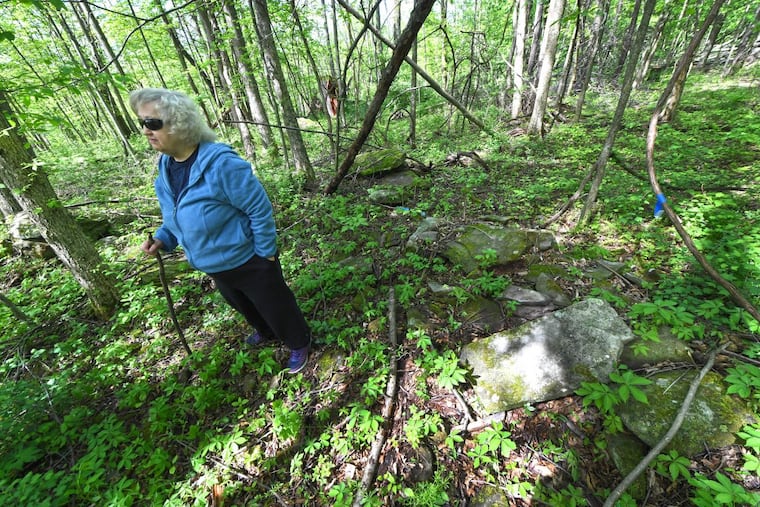SCOTUS will dig into debate over alleged cemetery on Pa. farm
A debate over an alleged cemetery on a Lackawanna County farm has morphed into a far-ranging court case that could affect property law in the United States.

SCOTT TOWNSHIP, Pa. — Fieldstone walls run bone-straight beside wheat and rye on Rose Mary Knick's land, rock by backbreaking rock lugged by horse and human hand long before she or anyone in Lackawanna County was born.
Knick, 69, rode shotgun in a friend's pickup on a gravel road there Monday. It bounced through a barway into the mud and waist-high mustard weed that edged her fields, and parked by a cut in the tree line. Knick hopped out and steadied herself along with a stick until more fieldstones appeared in a clear rectangular pattern, marked with blue tape, in the woods.
"I have no idea why they're here, but neither does anyone else," Knick said under the canopy of trees.
One person does have an idea.
"There's tombstones there," said Robert Vail, 85.
Knick's 90 rolling acres may, or may not, be home to a centuries-old cemetery. An ancestor of Vail's could lie beneath those stones. When Scott Township officials stepped into the debate in 2012, the issue grew far thornier than the briars that hug Knick's trails. Come autumn, the U.S. Supreme Court will attempt to clear it up, and a ruling could affect landowners' rights nationwide.
"It's not even about the cemetery anymore," Knick said. "It's about the Constitution."
The nation's highest court will not decide whether bodies are buried on Knick's land. No one may ever know, either, as long as Knick is alive and owns the land, which is posted with numerous "No Trespassing" signs. She wants her property to remain private. Vail would like access to it.
"Private property is private property," she said.
The trouble started in 2008, when Vail said he discovered an obituary for Micah Vail, an ancestor from the area, who is said to have been buried on the McLaughlin Farm, which is now Knick's property. Vail believed other family members were buried there, too, including a Revolutionary War veteran. He said he sought permission from Knick to visit the property and said he had seen the tombstones there.
"My only interest is getting in there and honoring them," Vail said by phone Wednesday. "I don't want the cemetery. Good grief."
Knick, who purchased the farm in 1970 to raise horses, denies Vail ever personally spoke to her. She says she first caught wind of the issue in 2008, when it was being discussed at public meetings. The Vails, she noted Monday, are "politically connected" in the area. In 2012, Scott Township supervisors passed an ordinance that in essence granted public access to private cemeteries during daylight hours; landowners could be fined $300 to $600 per day if they didn't comply.
J. David Breemer, an attorney with Pacific Legal Foundation representing Knick, said Scott Township's action is a direct violation of the Fifth Amendment, which prohibits the taking of private property without compensation.
"It's a pretty serious intrusion," Breemer said. "It shouldn't be hard for a court to decide this is a taking of property or not."
Knick sued Scott Township in Common Pleas Court in Lackawanna County in 2013, claiming her property rights were violated. That court refused to rule on Knick's case, according to her legal team, so she filed in U.S. District Court. In 2015, the federal court granted the township's motion to dismiss Knick's case, citing a 1985 Supreme Court decision known as Williamson County, which required plaintiffs to first file suit in state court, which Knick had already done.
One legal expert described the Williamson County decision as "Kafkaesque" for property owners.
"Only property owners have to go through this technical maze," Breemer said.
A U.S. Third Circuit Court of Appeals panel upheld the Middle District of Pennsylvania's decision last year, again citing the Williamson case. That ruling seemed to suggest Knick's initial grievance had merit, however.
"The Township's ordinance is extraordinary and constitutionally suspect," Judge D. Brooks Smith wrote.
The Supreme Court accepted Knick's case in March, because of questions presented by the Williamson case, particularly whether landowners should have to exhaust all means at state court before filing in federal court.
Mark J. Kozlowski, a Scranton attorney representing Scott Township, said officials believe that District Court and the Third Circuit got it right and hope the Supreme Court will affirm those decisions.
"The decision of the court will have a wide effect on property law in this country," Kozlowski said.
Vail said health reasons would prevent him from making the 262-mile trip to Washington in the fall for arguments. He's baffled things have gone this far.
"It's absolutely ridiculous," he said Wednesday by phone. "The court's time she has wasted and the money she was wasted. All I want to do is walk into the cemetery, clean it up a little, and plant a flag."
Knick said she spent "many thousands" of dollars on the case before Pacific Legal Foundation, a firm described on its website as challenging "burdensome laws in courts and legislatures across the country," took the case pro bono. She'll be going to Washington, but then she'll be back up to Lackawanna County, where her roots are deep.
Knick stood by a sun-bleached barn Monday by the main country road that bisects her property, her sneakers and pants muddied from trekking through the fields. She said if she ever saw anyone on her property, she'd call the police and have them arrested.
"It's private and it's peaceful," Knick said. "I don't plan on going anywhere."